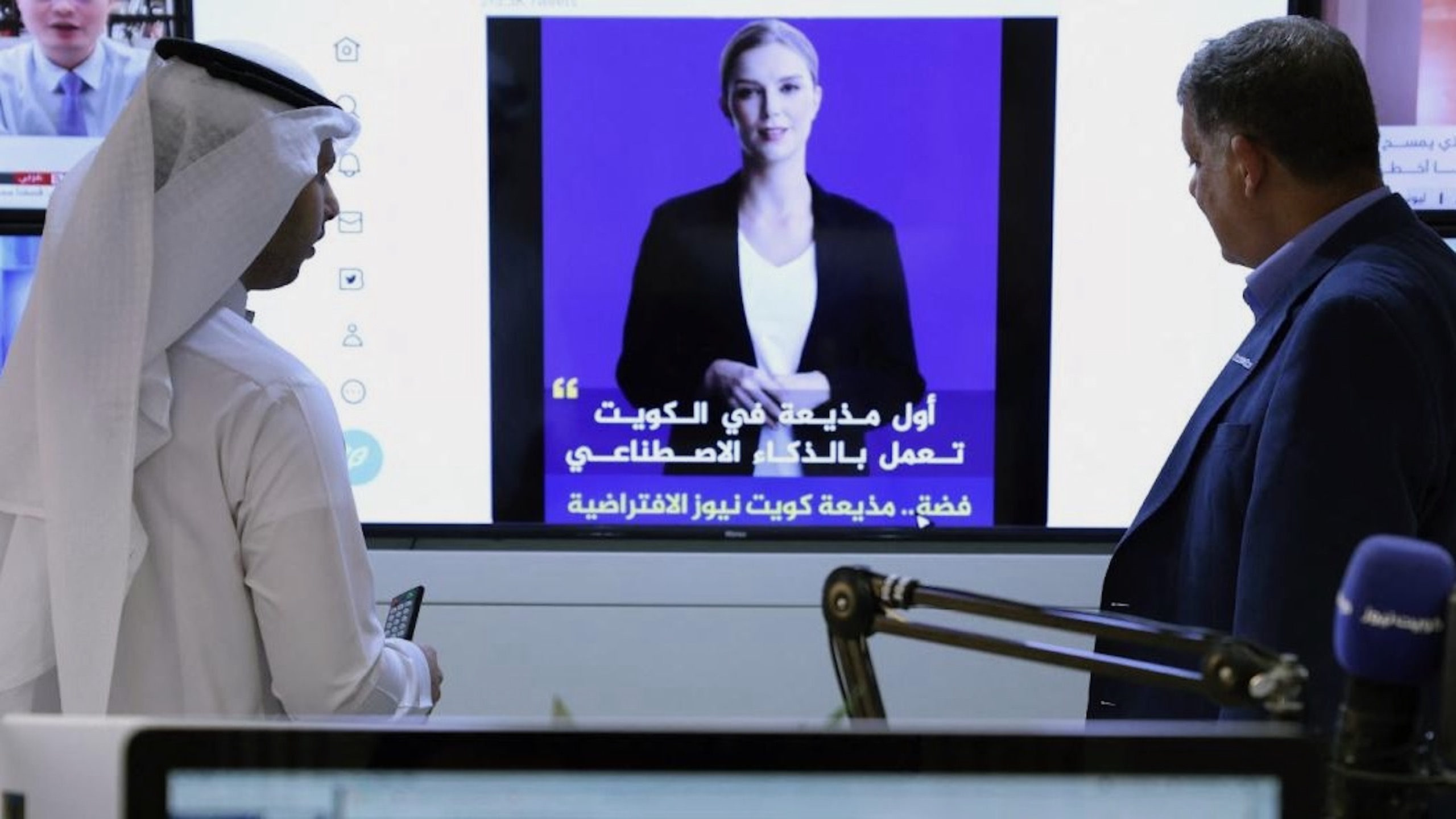
A Kuwait news outlet has unveiled the country’s first ever AI-generated news anchor – and there are plans for her to read online bulletins on the news site’s Twitter page.
The news anchor, who introduced herself as Fedha, stunned social media users when the outlet uploaded a short video clip of her clad in a black jacket and white T-shirt.
“I’m Fedha, the first presenter in Kuwait who works with artificial intelligence at Kuwait News. What kind of news do you prefer? Let’s hear your opinions,” said the blonde AI-generated anchor in Arabic.
Also read: Bitcoin Soars 84% To Reach 2023 High as Fed Expected to End Rate Hikes
Deputy editor-in-chief for Kuwait News, Abdullah Boftain, told AFP news agency that the move tested AI’s potential to offer “new innovative content.
“Fedha is a popular, old Kuwaiti name that refers to silver, the metal. We always imagine robots to be silver and metallic in colour, so we combined the two,” he added.
Boftain suggested Fedha’s blonde hair and light-coloured eyes reflected the country’s diverse population of Kuwaitis and expatriates.
Not the first AI news reader
Kuwait is not the first country to introduce an AI-generated news reader. In 2018, China’s state news agency introduced its own virtual news reader who wore a sharp suit and spoke in a somewhat robotic voice.
Xinhua News claimed the presenter could “read texts as naturally as a professional news anchor,” although there were reservations from the market about this claim.
According to a BBC report Chinese search engine Sogou was involved in the system’s development.
أول مذيعة في #الكويت تعمل بالذكاء الاصطناعي
• #فضة.. مذيعة #كويت_نيوز الافتراضية
• ما هي نوعية الأخبار التي تفضلونها بتقديم #فضة زميلتنا الجديدة؟ .. شاركونا آراءكم pic.twitter.com/VlVjasSdpb
— كويت نيوز (@KuwaitNews) April 8, 2023
“I will work tirelessly to keep you informed as texts will be typed into my system uninterrupted. I look forward to bringing you a brand-new news experience,” said the AI generated presenter in an introductory video.
Xinhua said the presenter could work 24 hours a day on their website and social media channels, “reducing production costs.”
“Overall, it will be interesting to see how AI- generated presenters like Fedha continue to shape the future of news and media,” commented writer Eliana David in a tweet.
Worries over job losses
While AI has been praised for its potential to revolutionize production across sectors, it also comes with pitfalls – notably, the possibility of huge job losses due to advancements in technology.
Investment bank Goldman Sachs last month released a report showing that AI could replace as many as 300 million full-time jobs across the globe. The report says the impact of AI will vary across different sectors, with at least 46% of administrative tasks and 44% legal tasks able to be automated. The figure was just 6% for construction and 4% for maintenance.
The growing demand for chatbots following the launch of ChatGPT has seen the market turning to AI for various tasks such as writing or transforming text into audio. Even artists and their work are not safe from the dangers posed by AI proliferation.
Carl Benedikt Frey, future of work director at the Oxford Martin School, Oxford University, told BBC News: “The only thing I am sure of is that there is no way of knowing how many jobs will be replaced by generative AI.”
He highlighted the fact that AI could enable people with no writing skills to produce eloquent articles, books and essays.
“Journalists will therefore face more competition, which would drive down wages, unless we see a very significant increase in the demand for such work.”
Stuck in uncanny valley
While there are widespread fears of AI-induced job losses, another school of thought is that the technology can never fully replace humans, advanced as it may turn to be.
In the case of the AI-generated presenters, they have been said to be stuck in an “uncanny valley.” Uncanny valley is a term used to describe human-like robots and avatars whose mannerisms are subtly unrealistic or unnatural.
Some audiences who watched the Kuwait News video feel more could have been done to even improve the video.
“Unfortunately, the quality is poor. High quality is available and not expensive,” said one user.
- SEO Powered Content & PR Distribution. Get Amplified Today.
- Platoblockchain. Web3 Metaverse Intelligence. Knowledge Amplified. Access Here.
- Source: https://metanews.com/kuwait-unveils-first-ai-generated-news-anchor/
- :is
- 10
- 2018
- 2023
- 8
- a
- Able
- About
- across
- added
- administrative
- advanced
- advancements
- AFP
- agency
- AI
- Although
- always
- Anchor
- and
- Another
- AR
- ARE
- articles
- artificial
- artificial intelligence
- AS
- At
- audiences
- audio
- Automated
- available
- Avatars
- Bank
- bbc
- BE
- Black
- Books
- Bringing
- by
- CAN
- case
- channels
- chatbots
- Chinas
- chinese
- claim
- claimed
- CO
- combined
- commented
- competition
- construction
- content
- continue
- Costs
- could
- country
- country’s
- dangers
- David
- day
- Demand
- describe
- Development
- different
- Director
- diverse
- down
- drive
- editor-in-chief
- enable
- Engine
- Even
- EVER
- expected
- expensive
- experience
- Eyes
- Face
- fears
- Fed
- Figure
- First
- following
- For
- Forward
- from
- fully
- future
- Future of Work
- generated
- generative
- Generative AI
- globe
- Growing
- Hair
- Have
- hear
- High
- Highlighted
- Hikes
- HOURS
- How
- HTTPS
- huge
- Humans
- i
- Impact
- improve
- in
- Increase
- informed
- innovative
- Intelligence
- interesting
- introduce
- introduced
- involved
- IT
- ITS
- Job
- Jobs
- Keep
- Kind
- Knowing
- kuwait
- Last
- launch
- Legal
- like
- Look
- losses
- maintenance
- many
- Market
- Martin
- May..
- Media
- metal
- million
- Month
- more
- move
- name
- news
- notably
- of
- offer
- Old
- on
- online
- Opinions
- own
- Oxford
- oxford university
- page
- People
- plans
- plato
- Plato Data Intelligence
- PlatoData
- poor
- Popular
- population
- possibility
- potential
- Praised
- prefer
- produce
- Production
- professional
- quality
- Rate
- rate hikes
- reach
- Read
- Reader
- refers
- reflected
- released
- replace
- replaced
- report
- revolutionize
- robots
- safe
- Said
- says
- School
- Search
- search engine
- Sectors
- Shape
- sharp
- significant
- Silver
- skills
- So
- Soars
- Social
- social media
- somewhat
- State
- such
- Suit
- system
- tasks
- Technology
- that
- The
- The Future
- their
- therefore
- thing
- thought
- tirelessly
- to
- transforming
- true
- TURN
- Turning
- university
- unveiled
- Unveils
- uploaded
- User
- users
- Valley
- various
- Video
- Virtual
- Voice
- wages
- Way..
- Website
- What
- which
- white
- WHO
- widespread
- will
- with
- Work
- works
- would
- writer
- writing
- Your
- zephyrnet












